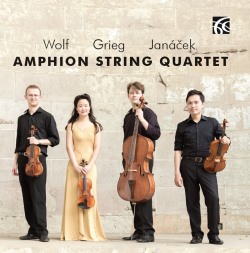
Support us financially by purchasing
this through MusicWeb
for £12 postage paid world-wide.
 |
Hugo WOLF (1860-1903)
Italian Serenade (1887) [6.23]
Edvard GRIEG (1843-1907)
String Quartet in G minor, Op. 27 (1878) [34.16]
Leoš JANÁČEK (1854-1928)
String Quartet No. 2 Intimate letters (1928) [26.24]
Amphion String Quartet (Katie Hyun (violin), David Southorn (violin), Wei-Yang Andy Lin (viola), Mihai Marica (cello))
rec. 6-9 February 2014, Wyastone Leys, Monmouth, UK
NIMBUS ALLIANCE NI 6289 [67.03]
Founded in 2009 the Amphion String Quartet for its debut release on Nimbus Alliance has turned to the late-Romantic works of Wolf, Grieg and Janáček.
Originally named ‘Serenade in G major’ Hugo Wolf wrote his single movement Italian Serenade for string quartet in 1887. It was first performed in 1904 after Wolf’s death in both the version for string quartet and his own 1892 arrangement for chamber orchestra. It’s a work that speaks of ecstatic love in a rather chocolate-box world where nothing disquieting ever happens. Throughout my years attending chamber recitals the Italian Serenade has been an enduring fixture on quartet programmes. There is an unsullied exuberance to the playing of the Amphion with the leader displaying immaculate intonation.
Grieg’s String Quartet No. 1 in G minor from 1878 is the second of three string quartets. The first quartet, a student work, was lost and the third quartet was left unfinished. The four movement G minor score, written during his time living at a Hardanger farm, was introduced at Cologne in 1878. Perhaps surprisingly owing to its quality the G minor Quartet is not too frequently seen on chamber programmes. The playing of the Amphion brings out the lovely contrasting moods of exuberance, beauty and lovelorn tenderness.
The final piece - the Janáček - is a late work from 1928. Known as Intimate letters, the quartet was inspired by the composer's infatuation for Kamila Stösslová his muse who was thirty-eight years his junior. Janáček enjoyed a lengthy and deep friendship with the married Stösslová exchanging more than seven hundred letters with her. The quartet has for the last decade or so been much in vogue both in recital and in the recording studio. In this compelling account I found the anxiety and torment given to the opening movement quite riveting. A love letter in music, the Adagio is as unfailingly tender as any account I have heard. The intense yearning quality of the Moderato with its undercurrent of uneasiness feels profound and in the Finale: Allegro the incisive playing just overflows with vibrancy and spirit.
The crystal clear sound and balance is a credit to the expertise of the engineers and the decently written liner-notes contain all the basic information required. This is a really excellent release. For a relatively young ensemble the playing of the Amphion String Quartet is remarkably mature and displays impeccable intonation, unity and glorious musicality.
Michael Cookson
|



 All Nimbus reviews
All Nimbus reviews








